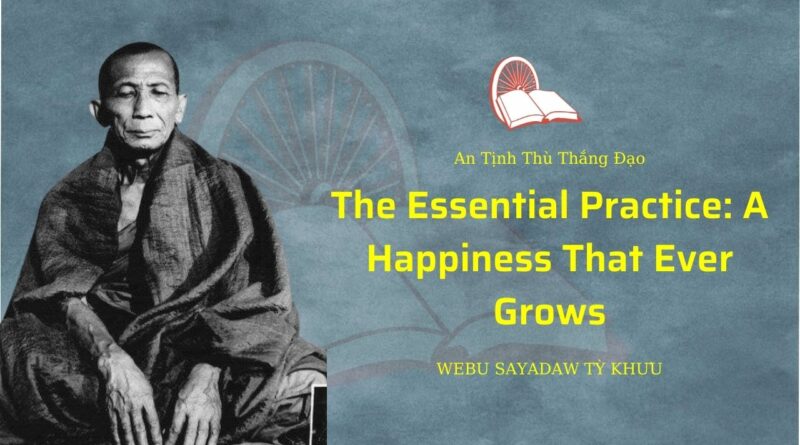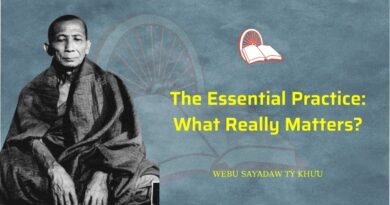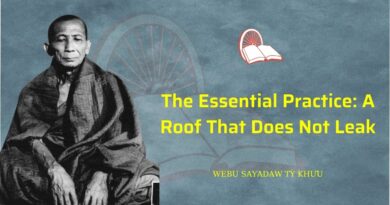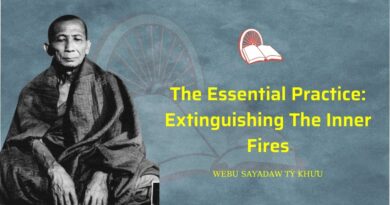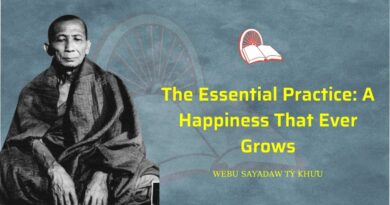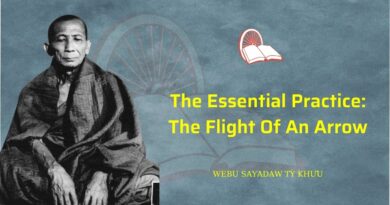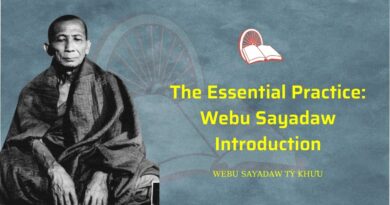Nội Dung Chính
A Happiness That Ever Grows
WEBU SAYADAW: Be perfect in the practice of morality (sila). Only if your practice is perfect will all your aspirations of the present time and of the future be fulfilled without exception. Because this is true, the aspirations of the good people of the past who practiced and strove were fulfilled completely. You too have to take up the practice of that morality that brought about their happiness. Work hard and perfect yourselves in it.
Being perfect in morality, keep your mind straight and practice charity (dana) as it pleases you, giving your possessions yourselves with sincerity to those who are worthy. Approach and give your gifts and your respect to the peerless Buddha and his teachings, keeping in mind your aspiration for awakening, Nibbana. This type of aspiration is called right aspiration. What you realize when you penetrate the Four Noble Truths is called “Bodhi,” awakening.
There are different types of Bodhi: Sammasambodhi (Buddhahood), Paccekabodhi (Non-teaching Buddhahood), and Savakabodhi (Arahatship). There are different types of Arahatship: Aggasavaka (Chief Discipleship), Mahasavaka (Main Disciples), Pakatisavaka (Disciple and Arahant). You have always to keep in mind your aspirations for Nibbana, the highest goal.
Aspirations thus formed are well formed. After having perfected yourself according to your aspiration, enter Nibbana. The noble persons who have attained Nibbana are innumerable. Why could they bring their various aspirations for Bodhi to fruition? Because they had been born into the right form of existence at the right time and because they exerted proper effort.
When is the time when these aspirations can be brought to fruition? From the moment the Buddha attained awakening many human beings, Devas and Brahmas came to the Buddha to pay respect and to show their devotion. But no human being, no Deva and no Brahma was satisfied by merely being in the presence of the Buddha and having the opportunity to pay respect. The Buddha observed them through his mind’s eye and taught them the truth which he had penetrated through his own superknowledge, his omniscience. As soon as they received the instructions of the Buddha they began to practice, to exert themselves with unwavering energy in all the four postures of the body. This effort that is continuous, without break or pause and full of joy, is called good effort. When their effort was perfect and equal to the effort of the wise of old, they arrived at their goal in due time and all the aspirations of their hearts came to an end. Because they had achieved this state they were exceedingly happy and blissful.
What was the nature of their happiness, their bliss? It was not happiness or bliss that lasted for only a moment or a single life time; it was that happiness that is so great that it is able to last for the remainder of samsara. Even if you are born in the human plane for only one life you are able to rise above the suffering of the cycle of birth and death.
In this way happiness and bliss come to you. When one has attained this happiness, when one has received the sign of bliss, when one has reached the goal, there is no jealous guarding of a secret. No, one will want all human beings, Devas and Brahmas to attain this bliss and happiness. As he knows for himself how to attain this happiness his acts of body, speech and mind will always be in harmony with the cause of attaining Nibbana. He will act with joy as his base.
How could so many human beings, Devas and Brahmas attain such high states of bliss? Only because they knew that they were going to bring the aspirations of their heart to fruition.
What are the things that support the Buddha’s teachings? They are the donation of shelter, robes, alms food and medicine for the monks. Having understood this, they practiced it. With these four requisites the wise supported the teachings of the Buddha. While they supported the teachings of the Buddha by donating the four requisites, many human beings, Devas and Brahmas received the instructions of the Buddha. They were endowed with the ability to understand and follow the instructions and they practiced with a joyful mind without taking rest, like the wise of old. When they thus practiced they attained their goal without delay. In just one moment innumerable human beings, Devas and Brahmas fulfilled the wish of their hearts. The energetic people saw this and supported the teachings of the Buddha and established them in a very short time. But they didn’t do only this, this didn’t satisfy them yet. In order to strengthen and make firm the teachings they would also meditate. So they were full of good volition and they were accordingly endowed with unwavering effort and faith.
Since the time of the Buddha there have been such noble people who supported and carried out the Buddha’s teachings with supreme effort, and ever since the days of the Buddha human beings, Devas and Brahmas have been attaining Nibbana. The number of those who have reached the goal in just a short moment can’t be reckoned, let alone the number of all who have attained Nibbana.
Now the good time for all the various noble people has come. This is so, because the time when a Buddha and his teachings blossom is the good time. The existences of human beings, Devas and all the happy abodes are good. Having been born into one of these, people accepted the teachings and, as you are doing now, practiced with full effort and arrived at the goal.
After his awakening the Buddha first honored the city of Rajagaha with his presence. The king of this great city, Bimbisara, came to the Buddha, and because he received the teachings and followed them he attained the goal. He was full of bliss. He wanted others to attain the same bliss, and understanding the reason, the cause of his happiness, he donated the four requisites. He did this so that his mother, father, grandmother and grandfather could fulfill their aspirations completely. The Buddha, out of his great compassion, dwelt in the king’s delightful garden. Humans, Devas and Brahmas came to revere him there and with great compassion he taught them what he had realized himself. In just one short moment innumerable humans, Devas and Brahmas achieved their aspirations. And after this it went on and on. The good time for all the people with noble aspirations had come!
The time at which there is a Buddha or his teaching is the good time. Human life, the life as Deva or Brahma, is a good life. Good effort is called the effort that is established after one has received the teachings. And what are the Buddha’s teachings? What is contained in the Tipitaka and is preached and explained by noble disciples out of loving-kindness and compassion are the Buddha’s teachings. They are very extensive, profound and difficult to understand. Though they are extensive, profound and difficult to understand, they really boil down to just one thing: the way of escape from suffering.
They are expounded by the wise in short and in full as time permits and everyone has knowledge of them according to his capacity. You all have some understanding of the Tipitaka, in accordance with your capabilities. If you were to talk about what you know it would never end. But you have to establish strong effort and focus your mind on one object, and keep out all other objects. When you fix your mind on one object exclusively with strong and stable effort, then you will be established in the teachings. Isn’t that so?
U BA KHIN: Yes, sir.
SAYADAW: To establish your attention thus is effort (viriya). When you fix your attention on one object and no other object enters your mind and your attention is stable you reach viriya iddhipada, the basis of attaining perfection by effort. Because the teachings are so extensive you may think it tiresome to practice them. That is why I instruct you in this way: that you can reach the goal quickly.
What happens to the causes of suffering — greed, aversion and delusion — when you control your mind in this way?
U: They are cut out and become quiet.
S: People write and preach a lot about greed, aversion and delusion, don’t they? When they debate, they talk only to win the debate, whomever they are talking to. But if they establish awareness of breathing and make their minds stable they acquire real merit. Why don’t we try to do this?
U: Yes, sir.
S: Will there be worry, fear and greed at that time?
U: There won’t be.
S: No, there won’t; there won’t be any worry, fear and greed. If there is worry, fear and greed, are you happy or unhappy?
U: Unhappy, sir.
S: And if there is no worry, fear and greed?
U: Then one is happy.
S: If one establishes effort only for one split-second the viriya iddhipada arises. It excludes worry, fear and greed and there is happiness. There are types of happiness which are not related to the happiness achieved through the Buddha’s teachings, but people still call them happiness. What sort of happiness am I talking about? I am talking about the happiness of becoming a human being or Deva, of becoming a king, a rich man, a universal emperor, a Deva king, a Sakka or a Brahma. Of course their enjoyment is also called happiness. But let me give you an example.
If you were asked to bear the golden royal insignia and live in the golden palace of a country that abounded with gold, silver, gems, rice, water and paddy, that was plentiful in everything, would you accept this offer or not?
U: Of course I would accept.
S: Of course you would accept. This country is so rich that there is absolutely nothing missing. So you would live wearing your crown in your golden palace smiling all the time. So I think, smiling like that all the time you would enjoy yourself, you would be happy, wouldn’t you? Would this happiness keep worry, fear and greed away?
U: No, it wouldn’t.
S: Oh, really?
U: It wouldn’t, sir.
S: I mean at that moment, you see.
U: It wouldn’t.
S: Why are they all smiling and happy then?
U: Somebody could try to usurp the kingdom. If something happens in his territory he would have duties to fulfill.
S: There is nothing like that. This country is so good that there is no danger or worry of that kind. It is a very peaceful country. There is no problem at all; everything is calm and quiet. There are no troubles at all, you just have to live in the golden palace wearing your crown. So simply live there with your ministers, troops, concubines and wives. You live always with a smile on your face. Will worry, fear, greed and anxiety be kept a bay in these circumstances? You are always smiling and happy. So, do you think there is no worry?
U: There will be, sir.
S: Why?
U: Because there is the fear of death.
S: Yes, there will still be the fear of death. But you are smiling still. What is this smiling? What about greed, aversion and delusion?
U: They won’t be kept away.
S: Even smiles won’t keep them away?
U: No, sir.
S: What do smiles mean?
U: They indicate that the object of mind is greed.
S: Really? Is one happy if there is greed?
U: No, sir.
S: Is greed cool and pleasant?
U: No, it isn’t.
S: Is it skillful or unskillful?
U: It is unskillful.
S: Are you happy when you are smiling as we just said?
U: No, sir.
S: But you are smiling great smiles, aren’t you, but you aren’t happy yet? You are king, aren’t you? Maybe you aren’t happy because you rule only one country? I’ll give you another one. So?
U: Even then I won’t be any happier.
S: Are you going to tell me that you don’t want another country?
U: No, sir, I would take it.
S: You would take it, but still not be happy. Well, I won’t give you just another country, I’ll give you the whole continent. Will you tell me that you don’t want it?
U: No, sir.
S: So, you will be happier then?
U: I won’t be happier.
S: Really? OK, I won’t give you just another continent, but the whole planet and the wheel-jewel of the universal monarch. Now there won’t be any worry or fear. With the turning of the wheel-jewel you will become universal monarch. Will you be happy now?
U: I won’t, sir.
S: Will you feel calm and cool?
U: I won’t.
S: Why not, disciple?
U: There is still the burning of greed, aversion and delusion in my mind.
S: Oh, is it still there?
U: It’s still there.
S: So you aren’t happy yet. Now, what about Sakka, the Brahmas and the Deva kings?
U: The same applies to them also.
S: We said they were happy and now you tell me the contrary?
U: The objects of their minds are greed, aversion and delusion.
S: Oh, really? Let it be. If one lives to a ripe old age always smiling and then dies smilingly, will he find peace in the cycle of births and deaths?
U: We won’t find peace.
S: Where will this smiling fellow go?
U: When the (good) karma of this smiling person comes to an end his fate will turn.
S: Yes, and where will this smiling fellow end up?
U: With his smiling, the mind will be controlled by greed and be destined for the lower worlds.
S: Oh, really?… I thought that being happy was good, disciples. Is it not good? I have to ask you, “Is it good?”
U: (Laughing) No, it isn’t.
S: OK, we are not happy yet. But when I asked whether we would be happy later on, you said no. There was no peace, you said.
U: There is no peace.
S: So, now there is no peace; What about later? Will it become just a little bit better?
U: It won’t improve, sir.
S: What will happen in the lower planes?
U: We will go to the lower planes.
S: Really? So, there is no peace now, there won’t be any after; what will be worse?
U: It will be worse later.
S: Oh. We all thought we were quite alright, but it is not so.But now we’ve got the teaching of the Buddha and we can have as much of it as we want, can’t we?
U: We can.
S: Endowed with the ability to accept the teachings we can take up one technique with steadfastness. Will the happiness that derives from this practice become less the more we use it, the more we practice?
U: It won’t.
S: Will it ever be exhausted?
U: It won’t.
S: Oh, really? My word, this thing is good. Isn’t it, my dear disciples? And if we use it all the time, continuously, will it then get used up, will it come to an end?
U: It will neither diminish nor get used up.
S: Wait a minute. We shall keep our attention focused while we are sitting like this, but while we are standing, can we still practice this?
U: We can.
S: And when we are walking?
U: We can.
S: Yes, we have to carry the burden of our body. It is not the same as other worldly possessions. When you work hard to acquire various jewels and gold and are successful, you will store them away in a certain place, I think. But having acquired our body and mind, the five aggregates,[12] is it possible to live with ease, happily and without making great efforts?
U: It isn’t possible.
S: We have to shoulder our burden. We can’t rest for a short moment even, can we? And for whom do we have to shoulder the burden of our bodies without ever taking rest?
U: For ourselves.
S: For the five aggregates.
U: For the five aggregates, sir.
S: Yes, we have to work, disciples. If I practice this awareness a lot, then I don’t want to miss this happiness that derives from it. Isn’t it possible to practice this all the time?
U: It is possible, sir.
S: This is very good. Will it diminish?
U: No, sir, it won’t.
S: Is it tiresome to keep up this awareness?
U: It isn’t tiresome.
S: Will you use up material goods you have saved up?
U: No, sir.
S: You won’t. What about your work, will it be disturbed?
U: It won’t be disturbed.
S: Will the others know about our practice?
U: They won’t notice.
S: Oh, the others won’t notice? Yes, when we have the teachings of the Buddha and practice them continuously, when we are able to focus our mind on the object, we won’t get tired, will we?
U: We won’t, sir.
S: We won’t spend anything; our work won’t be disrupted, and others won’t even notice. You receive the teachings in no time and then you say to yourself, “Now I shall follow these teachings.” When you have this volition and put forth effort then the viriya iddhipada factor will arise and you will arrive at the goal in no time. If you take up the practice now, will your progress be slow or fast?
U: According to circumstances, sir, sometimes it will be slow, sometimes…
S: No! Wait, wait…
U: Yes, sir.
S: Never mind about this. If I focus my attention according to the teachings and keep it with the awareness of respiration, isn’t this much possible?
U: It is possible.
S: Is this quick or slow?
U: It is quick, sir.
S: You see, if you establish effort the viriya iddhipada factor arises. Can you say how quick this is?
U: Yes, sir.
S: Have you put your attention there and does it stay?
U: Yes, sir.
S: As I decide to put it there, it stays, doesn’t it?
U: It does.
S: So if it stays, you have reached happiness. Are you able to speak as quickly as this happiness is able to arise?
U: I am not, sir.
S: It is easy to achieve happiness if you want it.
U: Yes, sir.
S: This is the highest sort of skillfulness. Do you hear? This is the highest, the highest. Only if you have past merits can you be born as a human being and receive the Buddha Dhamma. This type of skillfulness cannot be put in numbers. Do you understand? Then the six qualities of the Dhamma are there; the qualities of the Buddha, the Dhamma and the Sangha. When the Buddha taught this, the people understood. Among the six qualities of the Dhamma, akaliko is one, isn’t it? What does akaliko mean?
U: Immediateness.
S: Immediateness means that as soon as you fix your attention the results come. So, if you establish effort with intelligence the results come so quickly that you can’t say “there” quicker than they come; or you can’t even think that fast. Is it so? If you establish awareness now, if you keep it here with your effort, happiness arises in the very same moment. This is immediate. Who would have to question this anymore?
U: Who would have to doubt his own experience?
S: Yes, when happiness has arisen there is no looking for it anymore. The answer comes by itself, doesn’t it? It doesn’t take any time. All of you are bright people and you have understood the teachings of the wise and compassionate Buddha while still young, even before the words of instruction were complete. Though you understood, at times your mind will think as it pleases, but let us practice. What happens in the mind when we plan to practice to acquire merit? “I’ll perform merits later on, now I have to do this quickly.” Doesn’t this happen to you?
U: It does.
S: Is it good to think and speak like this?
U: No sir.
S: And when you make efforts and the viriya iddhipada factor has arisen; what is the right thing to do?
U: The right thing to do is to practice.
S: Yes. If you want to become happier and happier, you have to put forth effort as soon as you have received the instructions of the Buddha and have accepted them. Then the viriya iddhipada factor will arise. When you make use of this factor that arises in a split-second, does it get consumed?
U: It doesn’t.
S: Do it diminish?
U: It doesn’t.
S: You may decide that the happiness you’ve got was quite sufficient for now and the future and you say, “I don’t want to progress.” Can you practice and not progress?
U: One will progress.
S: If you practice not just for a short time, but longer, will you achieve only as much as you get out of a short period of practice?
U: One will get more.
S: This is good, disciple. This is possible because we are now in an auspicious era, because we are born into the right form of existence and because we make right effort. The energetic get the true answer even without asking others. Very good, do you hear? Isn’t this so?
U: It is so.
S: So, even if we live with this happiness all the time, it won’t diminish, it won’t be used up. And what happens if one doesn’t want to progress?
U: It isn’t possible not to progress, sir.
S: Yes. If you aspire to this there must be many different troubles. Is it possible to attain Bodhi or not?
U: It is possible.
S: It is possible now and in the future. So let us say, “I don’t want to progress,” and then focus our minds. Is this possible?
U: It isn’t possible not to progress if we work.
S: Do we achieve greater happiness the more we work?
U: We do, sir.
S: We can attain Bodhi and we can also choose the time and the place of birth. We can then choose a good existence as we wish. When you attain the happiness you desire, what else do you need?
U: Nothing else, sir.
S: You don’t need anything, you just have to choose. Is choosing tiresome?
U: It isn’t, sir.
S: You can drop at any time. There are four stages to Nibbana. Is it possible only for certain types of Ariyas — those who have attained one of the four stages? Do we have to choose the state of Nibbana?
U: No, sir.
S: What about the place?
U: It isn’t necessary.
S: Yes. All by yourself, without any help?
U: It’s possible.
S: And in a crowd? If you go outside the pagoda it won’t be possible, I think. It is easy, isn’t it? The Buddha, the all-compassionate and omniscient, taught many humans, Devas and Brahmas the knowledge he had attained through penetrating the truth himself. These beings, full of confidence after receiving the teachings, were able to fulfill their aspirations.
As you establish awareness you should establish continuous effort. There are many different types of people. Some are good at reciting or reading or preaching or explaining. I have no doubt about you, disciples, with whomever you compete you will win.
U: Yes, sir.
S: Yes, though they are victorious in their talk, will they achieve anything if they don’t practice?
U: No.
S: So, what’s the difficulty? Talking is tiresome, isn’t it? All we have to do is to make efforts to bring to fruition the aspirations we have made and work as the wise of old did. Understanding that we have to take up this work our minds will be focused. You are very busy. You may say, “We will practice later, when we are free.” Does this thought come up still?
U: It does.
S: Sometimes the mind is like that. But I think you don’t actually say so?
U: Maybe, sir.
S: You even speak your mind?
U: We do.
S: Well, if you want to say this, never mind. But, for the future can’t you burn these impurities out? You do have the teachings of the Buddha and when this happens to you (i.e., if you want to procrastinate), get rid of doubts. Strive to get the answers without asking others. If you focus right now won’t you get them immediately? Isn’t this possible?
U: Yes, it is possible, sir.
S: Is it possible to focus as you sit here?
U: Yes, it is, sir.
S: Is it possible to maintain the happiness you achieve in this way also when you are standing up?
U: It is, sir.
S: Yes. And when you walk?
U: It’s also possible then.
S: And when you carry out all your many responsibilities?
U: Then also it is possible.
S: You see, it is always possible.
U: If one is able to do it, it’s possible.
S: What ability do you need? There is nothing difficult in it. Or is it difficult?
U: Once one has acquired proficiency in this it isn’t difficult anymore.
S: He says that it is not possible after all to simply focus here. Just put your attention here. That’s all. Well, isn’t it that easy?
U: It is easy, sir.
S: It is ever so easy. The Buddha is incomparable. He accumulated virtues without ever resting. He completed his parami on his own working for the welfare of all. Didn’t he?
U: Yes, he did.
S: And because he could complete them it is easy for us now, isn’t it? It is easy. How is it today? You have to raise yourself happily and complete your work, and then, in accordance with your aspirations, you simply take the bliss you desire. It is ever so easy. Don’t be modest. Don’t allow yourselves to think, “This is not possible for me,” “This is not suitable for me,” “This is not proper for us,” “This is not for me.” Aim at what you desire. You will get it. Isn’t this so?
U: Yes. It is, sir.
S: In the days of the Buddha too, humans, Devas and Brahmas came to the Buddha, worshiped him and after they received his teachings they achieved everything; they completed all their different aspirations, didn’t they?
U: They did.
S: Isn’t it possible to fulfill your aspiration by establishing unwavering effort while you are a king? Can you count the names of the kings who attained complete understanding of the Dhamma?
U: They are without number, sir.
S: Many wealthy people made efforts and attained understanding while continuing their work in business, didn’t they?
U: They did.
S: Isn’t this possible?
U: It is, sir.
S: Can you count such wealthy people in numbers?
U: No, sir.
S: What about people who were neither kings nor rich people?
U: They are innumerable.
S: Didn’t all those who received the teachings and followed them assiduously fulfill their wishes?
U: They did.
S: Humans and devas, all of them, lay disciple! What about now, lay disciple? The period of time is the same, the occasion is the same, the plane of existence is the same. If we simply establish our effort and take the teachings, do we still have to choose certain times to practice?
U: There is no need for that.
S: Really?
U: That is correct, sir.
S: Yes! The time and the form of existence is right. You can achieve your aspirations at the time you wish to. Can’t you?
U: That’s right, sir.
S: Yes! Do you understand? Before, they didn’t practice because they were busy. How is it with this “I’ll practice when I’m free”? Do we still have to set times like this?
U: It is not necessary to set aside certain times.
S: What happens if we practice only when we are free? If we stop the practice then we won’t attain what we ought to attain. But now we get these jobs done and what else? We also fulfill our aspirations. We get two things done at the same time. Don’t we, lay disciples? What is better: to get one thing done or to get two things done at the same time?
U: It is better to get two things done, sir.
S: You see, it’s worth keeping yourself busy. But, even though I say that it’s working keeping yourself busy, don’t start to enjoy simply being busy. If you want to realize the teachings, don’t just keep running all the time. If you establish effort at the same time, the viriya iddhipada factor will arise. Make yourselves firm in this. If you say that you want to do this work, but still distract yourselves here and there, your progress will be slow, but if you establish this awareness and keep it up happily, then you will make progress. What about this work that you can’t avoid having to do?
U: We will also make progress with that.
S: Yes, lay disciples. One doesn’t only get the results of this noble work, but much more. What I say is what the Buddha preached. I’m not adding anything.
Now you are all people of great effort, aren’t you? But I just wanted to warn you. What I just mentioned (about being too busy) can happen at times. When you get some holidays you decide to come here and meditate for a few days. Then, you have to go back to work and don’t get time off anymore. You don’t come back. Does this happen sometimes?
U: It does happen.
S: Then you abandon the meditation, don’t you? Don’t abandon it. Carry on with this awareness and at the same time do your work. Then you get two in one go, you get two. If you postpone being aware to your hours of leisure you get only one benefit. You are not fulfilling aspirations which are ordinary, are you? You can attain to the highest and noblest bliss.
Now, what are these aspirations you are going to fulfill? There are the different forms of Bodhi. Bodhi means the penetrating understanding of the Four Noble Truths. If you establish effort saying that you want to get it, you can fulfill all your different aspirations for Bodhi right now. This is not ordinary.
And how are you going to fulfill them? Each type of Bodhi has to be fulfilled in its own way; Sammasambodhi as Sammasambodhi, Paccekabodhi as Paccekabodhi. Only if we understand in this way do we understand correctly. It is like planting a mature seed when it rains; a plant springs up. Here this plant is nursed well and when you go back it is deep rooted and strong. Is it possible to explain how good this period, this time is? It is so easy now, lay disciples! How is it: is this a time when one is oppressed by worries and has to groan and moan?
U: No, sir.
S: Is it a time when we can only stare resignedly?
U: No, sir.
S: It is a time in which we can be happy and blissful immediately and never get enough of this joy. You get even more than you wanted, you get even more than you aspired for, don’t you, disciple?
U: Yes, sir.
S: Oh, yes. You never get tired, not in the present and not in the remainder of samsara.What are the teachings of the Buddha? There is nothing that causes stress and misery in the teachings. Is there? There isn’t! It is pure happiness!
But the mind may get confused with many thoughts and I don’t think that these thoughts are very pertinent. Now, if you determine to establish this practice then I don’t think that thoughts of doubt will remain at the back of your mind. Can you not be successful in this way? The mind will think what it wills. Let it! Follow the teachings, do you understand? When you arrive at the goal you will probably find that it isn’t the way you expected it to be. Doesn’t this happen to people?
U: It happened many times, sir.
S: Yes, it will happen. Dear lay disciples, I am telling you only a little. Those amongst you who work hard will think, “This monk is reluctant to tell us all, he is probably very unwilling to part with his knowledge.” (Everybody laughs.) You will think, “This is much greater (than he said).” When you strive for real happiness and because of this arrive at the goal, then you experience something that you cannot describe with words. When you decide, “I’ll strive so that I will know for myself,” then don’t procrastinate. Don’t delay. Do you hear? This is so high. It is so good, lay disciples. Work hard, do you understand? You are all people of great effort, aren’t you?
U: Almost all are, sir.
S: Yes, good, good. Work hard, won’t you? You see, when you yourselves arrive at the goal — and for many of you even before that time — you can give this happiness to others. You will never feel reluctant to give. You will want to give a great deal of it, a great deal.
U: This is true, sir. In the course we are conducting now there are three or four students who after about three days of being here cry with great sobs because they regret not having come here earlier.
S: Yes, it is like that.
U: They think, “I should have come earlier!”
S: Yes, this happens! Work hard in order to attain the highest. This is the perfect place.
U: It is a place to which you gave your blessings, venerable Sayadaw!
S: This is a nucleus. It is the first center of many. Do you hear me? May this happiness spread slowly out from this place. Yes, yes, you must work hard, strive diligently. Working means that you must meditate and then at times you want to take rest. Does this also happen to you here?
U: It doesn’t, sir.
S: It doesn’t?
U: If the students start to meditate at 12:30 they come out of their meditation cells only at 5 pm. At the beginning they do take breaks, but after two or three days they don’t come out for breaks anymore.
S: Yes, you see! It’s like that! The highest bliss cannot be described in words. But the mind is like a magician. Though one may be meditating here like this, calmly, negative thoughts may arise: “Oh, it is so tiring to meditate, how can I achieve anything? I cannot do it.” Isn’t that so?
U: It is just as you say, sir. They do think in that way.
S: Yes, your mind may be cheating you, but after having established right effort there is no cheating yourself. Or is it still possible?
U: No sir, it isn’t.
S: Only before you really know can you cheat yourself.
U: Yes, sir.
S: Even so you may be saying to yourself that you are meditating too long. So, now take rest.
Notes
- 1.
- Cetiya: a mound-shaped monument often containing relics of the Buddha or enlightened monks, and treated as an object of veneration by the Buddhist community.
- 2.
- Uposatha: There are four Uposatha days a month: the full-moon day, the new-moon day, and the days in the middle between full-moon and new-moon and between new-moon and full-moon. On Uposatha days Buddhists traditionally observe the eight precepts and go to the monasteries for meditation and to listen to religious discourses. On the full-moon and new-moon Uposathas the monks assemble to recite the Patimokkha, the code of monastic rules, and to attend to other matters of the Order.
- 3.
- Lake Anotatta: a legendary lake in the Himalaya region.
- 4.
- Viriya iddhipada: the basis of attaining perfection by effort. This is one of the thirty-seven requisites of enlightenment taught by the Buddha; it is especially appropriate for a person who makes energy his particular vehicle for attaining success in spiritual practice. See Ledi Sayadaw, The Requisites of Enlightenment(BPS Wheel No. 171/174, 1971), pp. 72-77.
- 5.
- Universal monarch: a monarch ruling the whole planet righteously. Under the rule of the universal monarch there is prosperity and security for human beings.
- 6.
- Jewel of the wheel: The wheel of the universal monarch — the symbol of his power — arises when he has fulfilled all the conditions necessary for this position. (See Digha Nikaya iii, 81)
- 7.
- Pwe: traditional Burmese theater. It incorporates in a traditional play elements such as drama, clowns, music, dances, etc. It usually lasts all night until sunrise and spectators eat and enjoy themselves. It is attended by the whole family, takes place on the village heath or, in modern Burma, also in town halls. The performing troupes tour Burma in the dry season.
- 8.
- Uposatha: see Note in first talk.
- 9.
- Venerable Mahakassapa: one of the eighty great disciples of the Buddha, the seniormost at the time of the Buddha’s demise. He presided over the First Council held three months after the Buddha passed away.
- 10.
- In rural Burma people sleep on mats on the floor. Spreading a mat means getting ready to lie down.
- 11.
- Sitter’s practice: one of the ascetic practices (dhutanga). The monk observing the sitter’s practice does not lie down. Disciples of the Webu Sayadaw still keep up this practice.
- 12.
- The five “aggregates” or factors of existence: matter, feeling, perception, mental formations and consciousness.

